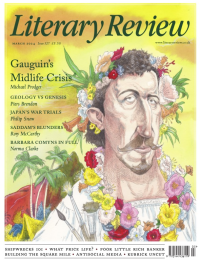Anna Parker
From Kyiv to Kilburn
Melting Point: Family, Memory and the Search for a Promised Land
By Rachel Cockerell
Wildfire 416pp £25
Family histories tend to follow an established format. The story of the author’s ancestors gets interwoven with that of the author’s own journey as they explore the past, discovering something about themselves in the process. Melting Point, Rachel Cockerell’s account of her family’s involvement in the Zionist movement, is a bold and provocative book that dispenses with the genre’s familiar approach.
Aside from in the prologue and afterword, Cockerell holds herself at arm’s length from the story she unfolds. She relies on first-hand accounts in the form of diaries, letters, memoirs, articles and interviews, which are broken into fragments and rearranged like a vast mosaic, with the aim of creating something ‘more like a novel than a history’. The speakers change from paragraph to paragraph, their identities recorded in italics in the margin of the page. The text shifts from past to present to future and back again, and the reader jumps between locations as reports from the Manchester Guardian, Aberdeen Press and Journal, Chicago Tribune, and New York Sunday Telegraph follow one another. We do not properly meet Cockerell’s great-grandfather David Jochelmann (born in 1869) until page 162. Each of his descendants is introduced with little fanfare, often appearing among a crowd. Other people – friends, acquaintances, colleagues, collaborators – press around the family tree, blurring the genealogical line.
Melting Point begins, not in Jochelmann’s home city of Kyiv, but in fin-de-siècle Vienna. Theodor Herzl, a celebrated journalist and author of the pamphlet The Jewish State (1896), which argues that Europe’s Jews should settle in Palestine, attends the first Zionist Congress in 1897. He calls on delegates to support

Sign Up to our newsletter
Receive free articles, highlights from the archive, news, details of prizes, and much more.@Lit_Review
Follow Literary Review on Twitter
Twitter Feed
Under its longest-serving editor, Graydon Carter, Vanity Fair was that rare thing – a New York society magazine that published serious journalism.
@PeterPeteryork looks at what Carter got right.
Peter York - Deluxe Editions
Peter York: Deluxe Editions - When the Going Was Good: An Editor’s Adventures During the Last Golden Age of Magazines by Graydon Carter
literaryreview.co.uk
Henry James returned to America in 1904 with three objectives: to see his brother William, to deliver a series of lectures on Balzac, and to gather material for a pair of books about modern America.
Peter Rose follows James out west.
Peter Rose - The Restless Analyst
Peter Rose: The Restless Analyst - Henry James Comes Home: Rediscovering America in the Gilded Age by Peter Brooks...
literaryreview.co.uk
Vladimir Putin served his apprenticeship in the KGB toward the end of the Cold War, a period during which Western societies were infiltrated by so-called 'illegals'.
Piers Brendon examines how the culture of Soviet spycraft shaped his thinking.
Piers Brendon - Tinker, Tailor, Sleeper, Troll
Piers Brendon: Tinker, Tailor, Sleeper, Troll - The Illegals: Russia’s Most Audacious Spies and the Plot to Infiltrate the West by Shaun Walker
literaryreview.co.uk